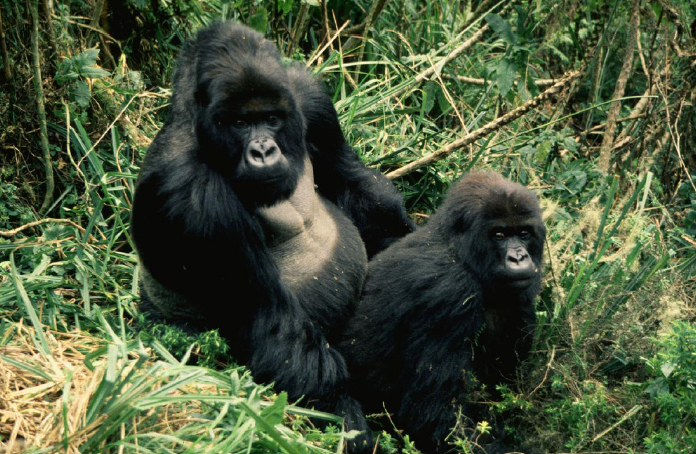Promiscuous Primates Hold Key to Animal Intelligence Research

Into the basement of the Admiral Bar we go, it’s Monday night and the Skeptics are meeting for one of their fortnightly talks. This week the speaker is Professor Dick Byrne of the University of St. Andrews, an expert on the evolution of cognitive and social behaviour, and founder of the Scottish Primate Research Group. As the Professor makes his way to the stage, a hush fills the room in anticipation of what’s to come: science. Professor Byrne is billed to tackle the tough subject of animal intelligence, drawing on over 30 years of personal experience and research as a primatologist.
Professor Byrne starts by highlighting the difficulties of scientifically describing intelligence. He explains that although intelligence tests can be useful within human populations, they are not equally reliable between different groups. The problem is greatly amplified when you try to measure the intelligence of animals. Consider a Border Collie and a sheep, suggests Professor Byrne. A sheep clearly follows instructions from the Border Collie, which in turn takes instructions from a farmer. There is a hierarchy of intelligence – the farmer is more intelligent than the Border Collie, which is more intelligent than the sheep. But you can’t be so sure, says Byrne. Sheep in India have learnt the different calls of farmers and follow instructions directly. Dogs are used only for protection. Are sheep just as intelligent as dogs? Or as Professor Byrne puts it: it’s just not so clear cut.
Professor Byrne specialises in primates and it’s these fascinating animals that fill the remainder of the talk. A wonderful anecdote is shared, detailing some time the Professor spent with gorillas. Professor Byrne observed two gorillas secretly copulating, out of view from the other gorillas. They were hidden because of the illicit nature of their romance; it was forbidden by their social class. This got Byrne wondering, to what extent are animals aware of the deceptive nature of their actions?
Tactical deception, a term coined by Professor Byrne and a colleague Professor Andrew Whiten, is when misinformation is given by one animal to another to elicit a wrong belief. Byrne had experienced first hand this behaviour in gorillas, but the literature didn’t seem to document the phenomena. After consulting with colleagues around the world, Byrne compiled a list of anecdotal, but documented, tactical deception in many different animals. The list suggested that various animals were involved in deceptive behaviours, but to what extent this displayed intelligence was unclear.
After carefully reviewing the considerable list of primates engaging in tactical deception and controlling for simply ‘learning by doing’, it became clear to Byrne and Whiten that only the great apes deceived deliberately, with
understanding of how their tricks worked. However, this led to a range of other questions – big questions, regarding the fundamental cognitive abilities of the animals and, potentially, theory of mind. How did they understand their deception? Were they aware simply of the other apes’ viewpoint, or could they possibly imagine, and manipulate, what they thought the other apes were thinking? It appears that whilst apes can take other minds into account, the extent of this is still unknown, and the Professor warned against over-excited beliefs based on too little evidence.
It also raised the question of what exactly happened that made great apes break away from the other primates. The Professor offered an explanation: smart feeding. Initially, this may not sound so intuitive, but the Professor made a compelling case for the argument. At the time of the Big Break-Away, apes were in direct competition with Old World Monkeys (monkeys not in South America) for the same food. The apes could only eat deliciously ripe fruit and soft leaves, however, the monkeys had no problem munching on tough leaves and hard fruit. Most great apes are extinct but the ones that remain have developed smart ways of feeding themselves, including elaborate ways of getting to hard-to-eat foods like nettles and thistles.
Professor Byrne caught the interest of the audience throughout his talk and this was felt in the Q & A session, when many insightful questions were asked. “What’s your opinion on the gorillas that appear to have learnt sign language?” prompted what was perhaps the highlight. The Professor responded with an “interesting but we should do more research” style response. He explained that it was clear that apes had learnt to communicate via sign language, but whether they had learnt grammar or had a real understanding of the language could not yet be determined. He said that the research was mostly shut down after a big controversy in the field in the 1970s, following Herbert Terrace’s conclusion to his Nim Chimpsky project. Terrace proposed that the apes had simply learnt conditioned responses, but had no syntactical understanding, and the funding stopped. Today, to Professor Byrne’s knowledge, there is no currently ongoing scientific research which attempts to answer the question of apes’ ability to learn languages. A shame, he says, as the research was indeed promising.
theGIST reporters thoroughly enjoyed the evening, and they are looking forward to the next Glasgow Skeptics event, featuring world-famous psychologist, Richard Wiseman, on March 10th.
The Glasgow Skeptics hold fortnightly talks to promote science, critical thinking and freedom of expression. The events are normally held in the basement of The Admiral Pub, but check the Facebook group, page and website for more details. The Glasgow Skeptics also run PubhD, a monthly get together where PhD students explain their theses in 10 minutes in a pub – look our for GISTers!










